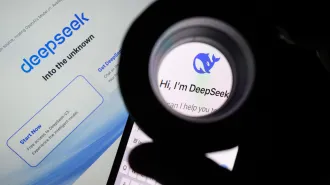A businessman at a trade show stealthily raises his camera-equipped cell phone to snap a picture of his competitor’s latest gizmo. But before he captures the image, an electronic foe gets the drop on him and blasts his camera with a blinding burst of light.
Although that scenario is fictional—so far—the counter-espionage system is not. Researchers at the Georgia Institute of Technology and spin-off company DominINC, both in Atlanta, have built an automated prototype that uses two infrared-transmitting cameras and a projector to protect a small space from digital spying.
The transmitters project infrared light into the area, and the cameras analyze reflections. An intruding digital camera gives itself away because its picture-making image sensor has an unusual property called retroreflectivity. That is, from any angle it reflects the infrared radiation directly back to the prototype’s cameras. Once a spy camera is located, the digital projector sends bright light just to the point where the offender’s lens has been spotted.
The prototype, described on June 17 by Georgia Tech, could lead to more-sophisticated systems aimed at pirates who surreptitiously record videos of commercial films in theaters and then sell illicit copies, says computer scientist Gregory D. Abowd of Georgia Tech and DominINC.






